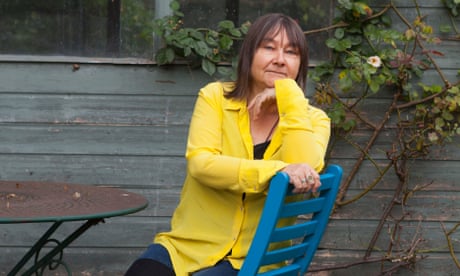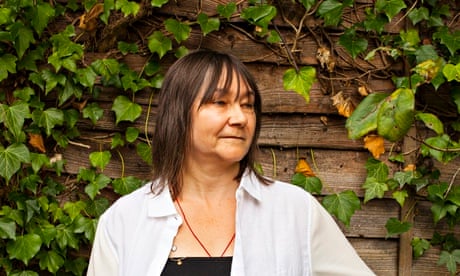Daniel is a century old. Elisabeth, born in 1984, has her eye on the future. The United Kingdom is in pieces, divided by a historic once-in-a-generation summer.
Love is won, love is lost. Hope is hand in hand with hopelessness. The seasons roll round, as ever . . .
Guardian Review
https://www.theguardian.com/books/2016/oct/12/autumn-ali-smith-review

 Ali Smith: ‘It’s a pivotal moment… a question of what happens culturally when something is built on a lie’
Ali Smith: ‘It’s a pivotal moment… a question of what happens culturally when something is built on a lie’ Ali Smith says her novel Autumn began life as a farce set in an antique shop. So how has it ended up interleaving two key national moments – the Profumo scandal and the current schism caused by Brexit? Smith’s most recent novel, the critically acclaimed and 2015 Baileys prize-winning How to Be Both, was an experiment in “duration” – the reader’s. It is comprised of two stories, one set in 15th-century Italy, which we might call A; and the other in modern-day Britain, B. Two editions of this novel exist: in one, the order runs AB; in the other, BA. The reader can, if she has the inclination, read the novel in both orders, one after the other. However, owing to the ineluctable conditions of linearity, we can only experience the novel for the first time in one order or another, AB or BA. This seems to be very much the point.
Autumn begins in a wild region of no-time, as Daniel Gluck dreams that he is young again, or dead: “He must be dead, he is surely dead, because his body looks different from the last time he looked down at it, it looks better, it looks rather good as bodies go … But pure joy! He’d forgotten what it feels like, to feel.” He feels stripped of all the “rotting rot … till everything is light as a cloud”. Yet he understands that this state of pure being will not last, and, abruptly, we return to quotidian reality, where everyone is defined by numbers and fixed categories: It is a Wednesday, just past midsummer. Elisabeth Demand – 32 years old, no-fixed-hours casual contract junior lecturer at a university in London, living the dream, her mother says, and she is, if the dream means having no job security and almost everything being too expensive to do … has gone to the main Post Office in the town nearest the village her mother now lives in. Elisabeth is defiantly reading Brave New World and waiting to apply for a new passport. The clock has stalled; miserable people queue alongside her, staring into space. “COMMUNITY, IDENTITY, STABILITY”, thinks Elisabeth, citing Huxley. Inevitably, when she reaches the front of the queue, her application is rejected. Her photograph is “the wrong size”, the man says. “He writes in a box … HEAD INCORRECT SIZE.” Then, he “folds the Check & Send receipt and tucks it into the envelope Elisabeth gave him with the form … He hands it back to her across the divide. She sees terrible despondency in his eyes. He sees her see it. He hardens even more.” Abandoning her doomed endeavour, Elisabeth goes to the Maltings Care Providers plc to see Gluck who, we discover, has been a close friend since she was a child. He is now 101 years old, and spends his days in “the increased sleep period” that “happens when people are close to death”. “His eyes are closed and watery. There’s a long time between each breath in and out. In that long time there’s no breathing at all, so that every time he breathes out there’s the possibility that he might not breathe in again." In a series of flashbacks, we discover how Elisabeth and Daniel first met, in 1993, when she was a child of eight and he was a venerable and intriguing neighbour. At the time, Daniel collected “arty art”, including the work of real-life artist Pauline Boty. A founding figure in British pop art, Boty created subversive, witty paintings and collages until her premature death in 1966. She recurs through the novel, as a symbol of all those who are “Ignored. Lost. Rediscovered years later. Then ignored. Lost. Rediscovered again years later. Then ignored. Lost. Rediscovered ad infinitum.” Always, Smith’s characters must rebel against other people’s mantras about the world, their certainties. As a child, Elisabeth disobeyed her mother’s injunction to stay away from Daniel. Boty refused to succumb to drab conventions about what artists who happen to be women might do.
In the uneasy present of Smith’s novel, the EU referendum has just occurred and Britain is full of “people saying stuff to each other and none of it actually becoming dialogue”:
All across the country, there was misery and rejoicing. All across the country, what had happened whipped about by itself as if a live electric wire had snapped off a pylon in a storm and was whipping about in the air above the trees, the roofs, the traffic. All across the country, people felt it was the wrong thing. All across the country, people felt it was the right thing. All across the country, people felt they’d really lost. All across the country, people felt they’d really won. The atmosphere is sullen: “The whole city’s in a storm at sea and that’s just the beginning.”
Daniel sleeps through the turmoil, like Rip Van Winkle, dreaming of life and youth. Elisabeth imagines parallel realities, beyond all the contemporary vitriol, where Daniel is awake. In a flashback, Daniel says to Elisabeth: “The rain falls. The wind blows. The seasons pass … and the leaves from all the trees round about fall … and when the costumes have rotted away or been eaten clean by creatures happy to have the sustenance, there’s nothing left of them, the pantomime innocents or the man with the gun, but bones in grass, bones in flowers, the leafy branches of the ash tree above them. Which is what, in the end, is left of us all, whether we carry a gun while we’re here or we don’t. So. While we’re here. I mean, while we’re still here.”
 Ali Smith: 'There are two ways to read this novel, but you're stuck with it – you'll end up reading one of them'
Ali Smith: 'There are two ways to read this novel, but you're stuck with it – you'll end up reading one of them' The books interview: The academic turned author talks to Alex Clark about modernism, imagination and why she could never be a lawyer If time demolishes all things, then does the febrile, forlorn present matter anyway? Does anything matter – Elisabeth’s friendship with Daniel, Boty’s lost art, or the sorrowful bureaucrat in the post office? I think Smith is writing about finitude, and how life is fleeting, extraordinary and improbable, and yet unique mortals are trammelled by external edicts, forced to spend their time earning minimal wages, measuring passport photographs with a ruler. In her memory-scapes and dreamworlds, Smith reveals the buried longings of her characters; their agony, their hopeful eagerness, their fear of death. At one point, she imagines “all the things from the past … like a huge national orchestra biding its time … all the objects holding still and silent till the shops empty of people … Then, when darkness falls, the symphony … The symphony of the sold and the discarded. The symphony of all the lives that had these things in them once. The symphony of worth and worthlessness.” Autumn is a beautiful, poignant symphony of memories, dreams and transient realities; the “endless sad fragility” of mortal lives.
